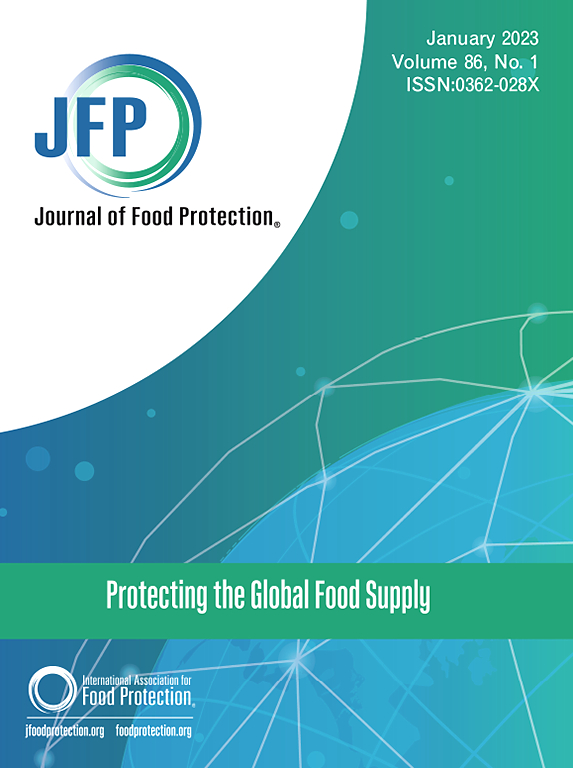Integration of National Chemical Hazards Monitoring, Total Diet Study, and Human Biomonitoring Programmes for Food Safety Exposure Assessment in Singapore
IF 2.1
4区 农林科学
Q3 BIOTECHNOLOGY & APPLIED MICROBIOLOGY
引用次数: 0
Abstract
Food safety and food security can impact the quality of human life, and these two aspects are interrelated alongside many influencing external factors. Global stressors such as climate change, recent pandemic, and geopolitical tensions have demonstrated tangible impacts on food security and safety. Food and food system innovation is a key strategy towards feeding the world in a more sustainable and climate-resilient manner. This paper highlights the use of a science-based risk assessment and management in Singapore’s food safety system, specifically in the integration of exposure assessment approaches to support evidence-based food safety risk analysis and decision-making. The use of complementary top-down and bottom-up exposure assessment approaches through the market monitoring programme, total diet study and human biomonitoring forms a comprehensive integrated exposure assessment strategy which can ultimately inform policy and measures in ensuring and securing a supply of safe food. The discussion on such application for chemical food safety in Singapore offers additional insights into the synergistic inter-relationships contributing to the exposure assessment associated with chemicals in food.
新加坡整合国家化学危害监测、总膳食研究和人体生物监测计划,进行食品安全暴露评估。
食品安全和粮食安全会影响人类的生活质量,这两个方面与许多外部影响因素相互关联。气候变化、最近的大流行病和地缘政治紧张局势等全球压力因素对粮食安全和食品安全产生了切实影响。粮食和粮食系统创新是以更具可持续性和气候适应性的方式为世界提供粮食的关键战略。本文重点介绍了新加坡食品安全体系中以科学为基础的风险评估和管理,特别是整合暴露评估方法,以支持以证据为基础的食品安全风险分析和决策。通过市场监测计划、总膳食研究和人体生物监测,采用互补的自上而下和自下而上的暴露评估方法,形成了一个全面的综合暴露评估战略,最终可为确保和保障安全食品供应的政策和措施提供依据。关于在新加坡将这种方法应用于化学品食品安全的讨论,为食品中化学品暴露评估的协同相互关系提供了更多的见解。
本文章由计算机程序翻译,如有差异,请以英文原文为准。
求助全文
约1分钟内获得全文
求助全文
来源期刊

Journal of food protection
工程技术-生物工程与应用微生物
CiteScore
4.20
自引率
5.00%
发文量
296
审稿时长
2.5 months
期刊介绍:
The Journal of Food Protection® (JFP) is an international, monthly scientific journal in the English language published by the International Association for Food Protection (IAFP). JFP publishes research and review articles on all aspects of food protection and safety. Major emphases of JFP are placed on studies dealing with:
Tracking, detecting (including traditional, molecular, and real-time), inactivating, and controlling food-related hazards, including microorganisms (including antibiotic resistance), microbial (mycotoxins, seafood toxins) and non-microbial toxins (heavy metals, pesticides, veterinary drug residues, migrants from food packaging, and processing contaminants), allergens and pests (insects, rodents) in human food, pet food and animal feed throughout the food chain;
Microbiological food quality and traditional/novel methods to assay microbiological food quality;
Prevention of food-related hazards and food spoilage through food preservatives and thermal/non-thermal processes, including process validation;
Food fermentations and food-related probiotics;
Safe food handling practices during pre-harvest, harvest, post-harvest, distribution and consumption, including food safety education for retailers, foodservice, and consumers;
Risk assessments for food-related hazards;
Economic impact of food-related hazards, foodborne illness, food loss, food spoilage, and adulterated foods;
Food fraud, food authentication, food defense, and foodborne disease outbreak investigations.
 求助内容:
求助内容: 应助结果提醒方式:
应助结果提醒方式:


